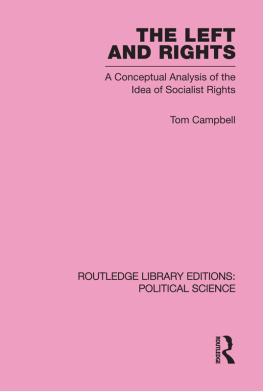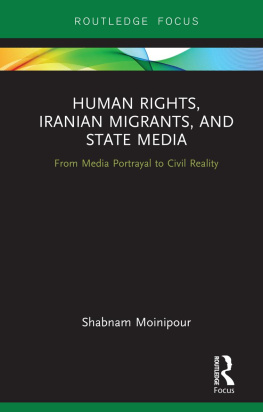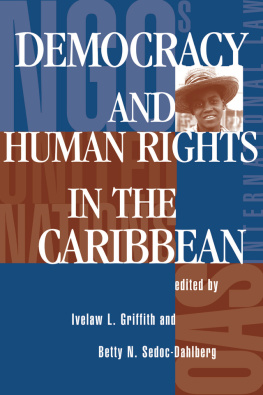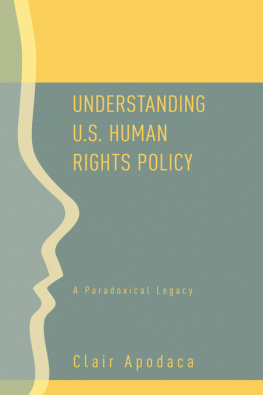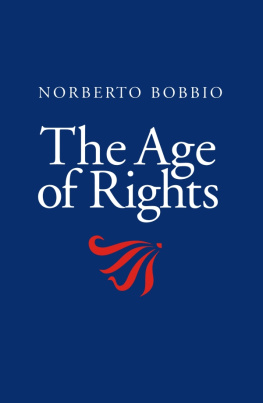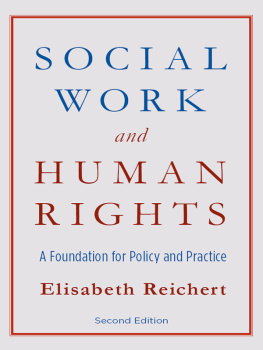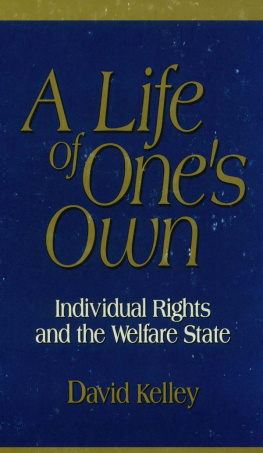ROUTLEDGE LIBRARY EDITIONS: POLITICAL SCIENCE
THE LEFT AND RIGHTS
THE LEFT AND RIGHTS
A Conceptual Analysis of the Idea of Socialist Rights
By
TOM CAMPBELL
Volume 50

First published 1983
This edition first published in 2010
by Routledge
2 Park Square, Milton Park, Abingdon, Oxon, OX14 4RN
Simultaneously published in the USA and Canada
by Routledge
270 Madison Avenue, New York, NY 10016
Routledge is an imprint of the Taylor & Francis Group, an informa business
1983 Tom Campbell
All rights reserved. No part of this book may be reprinted or reproduced or utilised in any form or by any electronic, mechanical, or other means, now known or hereafter invented, including photocopying and recording, or in any information storage or retrieval system, without permission in writing from the publishers.
British Library Cataloguing in Publication Data
A catalogue record for this book is available from the British Library
ISBN 10: 0-415-49111-8 (Set)
ISBN 13: 978-0-415-49111-2 (Set)
ISBN 10: 0-415-55592-2 (Volume 50)
ISBN 13: 978-0-415-55592-0 (Volume 50)
Publishers Note
The publisher has gone to great lengths to ensure the quality of this reprint but points out that some imperfections in the original copies may be apparent.
Disclaimer
The publisher has made every effort to trace copyright holders and would welcome correspondence from those they have been unable to trace.
The Left and rights
A conceptual analysis of the
idea of socialist rights
Tom Campbell
Professor of Jurisprudence
University of Glasgow

First published in 1983
by Routledge & Kegan Paul plc
39 Store Street, London WC1E 7DD,
9 Park Street, Boston, Mass. 02108, USA,
296 Beaconsfield Parade, Middle Park,
Melbourne, 3206, Australia, and
Broadway House, Newtown Road,
Henley-on-Thames, Oxon RG9 1EN
Tom Campbell 1983
No part of this book may be reproduced in
any form without permission from the
publisher, except for the quotation of brief
passages in criticism
Library of Congress Cataloging in Publication Data
Campbell, Tom
The Left and rights.
(International library of welfare and
philosophy)
Includes bibliographical references and
index.
1. Civil rights and socialism. I. Title.
II. Series.
ISBN 0710090854
To Magnus and Flora
Contents
Preface
The dogmatic type of linguistic philosopher who insists upon a particular set of meanings and concepts as the correct or only proper explication of a given area of discourse is less common than a decade or two ago, but the intellectual constraints imposed by inherited conceptual outlooks still present major hindrances to progressive social theorising. This is particularly evident in those central contested concepts of practical philosophy which are used to express competing ideological viewpoints. In this book an extended analysis of the idea of rights is undertaken in order to undermine some common prejudices against the concept of socialist rights in the hope that this will promote linguistic tolerance and perhaps help to establish a shared conceptual base for fruitful dialogue between theorists of the political Left and Right.
My thanks are due to numerous colleagues and friends at the Universities of Glasgow, Stirling, British Columbia and Vanderbilt, but especially to Antony Duff for his friendly scepticism, to Gerry Maher for his scholarly reassurances, to Mrs Helen MacDonald for her patient typing and retyping of the text, and to Mr Richard Susskind for his meticulous proof-reading.
Glasgow
1 Reformists and Revolutionaries
If we value and defend our rights is this an expression of human dignity or an indication of our selfish and alienated condition? Is the notion of individual rights tied to the competitive individualism of liberal capitalism or would rights have a central place even in a socialist utopia? Is socialism the fulfilment or the negation of human rights? These abstract and largely conceptual questions seem unrelated to immediate political concerns, and yet the answers to them overflow with fundamental practical implications that can alter our whole approach to the central ideological disputes of the twentieth century. A clear grasp of the nature of rights is vital to our understanding of the disagreements which recur between the Soviet bloc and the Western powers over human rights and can radically affect the way in which we think about social policy issues in the modern democratic welfare state.
If the ideals of socialism can be expressed in terms of individual rights then, however different socialist rights may be from those most highly prized by the classical liberals, there is at least a continuity and similarity of thought forms and basic concepts in which major political disagreements can be clarified and debated. But if the ideological basis of socialism is so far removed from that of liberal democracy that it has no use for the language of rights, then there can be little room either for compromise or for significant dialogue between socialists and liberal democrats. In so far as the peaceful solution of political disputes depends on sustaining communication between those in serious disagreements, the conceptual compatibility of rights and socialism has a bearing on the prospects of reducing the political uses of violence both within and between nations.
The compatibility of socialism and rights can be) And the explanation for the alleged failures of ostensibly socialist societies to match standards of protection for the individual normally attained in Western democracies could be due in part to fundamental incompatibilities between socialist doctrine and the concept of rights as well as to wider and less intellectual determinants of political and legal practice.
The Dispute within Socialism
To ask whether socialism is a friend or foe of individual rights may seem to draw the lines of conceptual battle between the allies and enemies of socialism, the former taking the position that socialism is the only effective protector of the essential rights of the individual, and the latter responding with the view that the corporate goals and methods of socialism grant no significance to and offer no protection for the most basic rights of free men. But this is far too simple a picture of this particular conceptual war. The dispute about rights and socialism is as much a debate within socialism as about it. True, there is a great deal of literature from what might be called a right-wing liberal stance to the effect that the introduction of new social and economic rights, such as the right to free health-care, education and employment, are in effect an undercover attack on the traditional civil liberties, and behind this there lies the more general charge that under socialism the individual counts for little against the requirements of society as a whole, or, more specifically, the working-class section of it. But a fiercer and in many ways more interesting and significant battle goes on within socialism itself between those who wish to reform and those who seek to jettison the liberal idea of individual rights. It is primarily to this family quarrel that I direct my attention.
Those socialists who reject the incorporation of the language of rights within socialism draw heavily upon certain non-socialist theories of rights, particularly those which propound an analytical connection between rights and law, and between law and coercion. This means that, in defending the view that socialism need not and indeed should not dispense with the idea of rights, I shall become deeply immersed in the criticism of those liberal theories of rights which are taken up into socialist critiques of rights. Thus, although my overall objective is to investigate a dispute within socialism, a great deal of the path to this objective will pass through the terrain of the central theories of rights in contemporary philosophical discussions.
Next page
